Embark on a journey of self-discovery with this list of questions – designed to help cultivate self-awareness and embrace growth!
Life is a pilgrimage, a constant journey of exploration and growth. As we navigate its winding paths, introspection emerges as the compass that guides us toward deeper understanding and fulfillment. By engaging in daily self-reflection questions, we embark on a transformative inner voyage that enables us to foster self-awareness, confront challenges, and embrace the potential for continuous transformation.
Highlights
- Self-reflection questions are prompts that help you explore yourself better by reflecting on your thoughts, feelings, behaviors, and goals.
- This article goes over a list of prompts that explore various aspects of yourself, from work and relationships to personal growth and well-being.
- In order to answer such questions, you need to have a dedicated space, set an intention, be curious, journal your reflections, and aim to go beyond the surface to identify patterns and themes.
What are Self-reflection Questions?
Self-reflection questions are prompts designed to help you gain a deeper understanding of yourself – including but not limited to your thoughts, feelings, behaviors, goals, and values. Their purpose is to encourage introspection in various aspects of life, such as:
- Values and beliefs: What truly matters to you? What principles guide your decisions?
- Strengths and weaknesses: What are you good at? What areas could you improve in?
- Goals and aspirations: What do you want to achieve in life? What are your dreams?
- Relationships and interactions: How do you connect with others? What kind of impact do you have?
- Habits and routines: What patterns do you observe in your daily life? Are they serving you well?
- Challenges and obstacles: What are you struggling with? How can you overcome these hurdles?
These questions can be asked at different times (e.g. in the morning, at night, or whenever you feel the need to reflect) – as well as in different ways, such as writing them down, speaking out loud, or sharing them with someone else.
Why Should We Ask Self-reflection Questions?
By three methods we may learn wisdom: First, by reflection, which is noblest; second, by imitation, which is easiest; and third by experience, which is the bitterest.
Confucius
Asking self-reflection questions is a powerful practice for self-discovery and personal growth. The benefits to reap from this habit are diverse, including:
- Increased self-awareness: By reflecting on your thoughts, feelings, and behaviors, you gain a clearer picture of who you are – which empowers you to leverage your strengths and work on developing weaker areas. On the other hand, it allows you to recognize the patterns and triggers that shape your daily reactions, leading to better control over your responses and emotions.
- Improved decision-making: Daily reflection sheds light on your core values – what truly matters to you – plus the unconscious biases that often come into play. This clarity is crucial to making objective decisions aligned with your principles, leading to greater authenticity and satisfaction.
- Enhanced relationships: A better understanding of yourself translates to more effective communication and stronger bonds. By reflecting on previous experiences, one is better equipped to demonstrate empathy for others, thereby fostering deeper and more meaningful connections.
- Personal growth: Asking self-reflection questions aids in identifying your aspirations – based on which you may set meaningful goals aligned with your values and strengths. During the process, you also have the chance to ponder over past mistakes, learn from them, and develop healthy coping mechanisms for dealing with stress and adversity.
- Greater self-compassion: By reflecting on personal strengths and weaknesses, you learn to accept yourself fully, flaws and all. This fosters self-compassion and reduces negative self-talk, leading to increased emotional well-being and confidence.
Each one should test their own actions. Then they can take pride in themselves alone, without comparing themselves to someone else.
Galatians 6:3-5
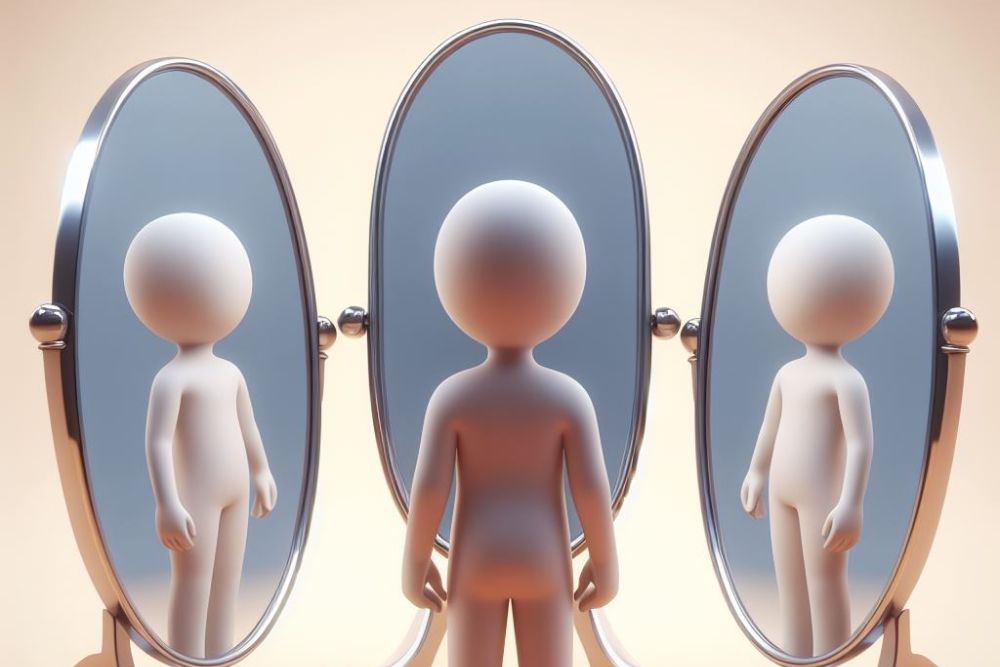
Self-reflection Questions by Type & Topic
It is always our own self that we find at the end of the journey. The sooner we face that self, the better.
Ella Maillart
Below, I have compiled a list of deep self-reflection questions to ask yourself – divided into separate categories.
Please note that this list is not exhaustive – feel free to use it as a source of inspiration, in combination with your own queries. When attempting to answer each of them, you should strive to come up with something unique and comprehensive on your own. The deeper you dig into each of the self-reflection questions below, the more clarity you will gain about yourself – and the more satisfaction you may reap from the process.
Work
- How do I feel about my current job role and responsibilities?
- What are my strengths and weaknesses in the workplace?
- Am I satisfied with my work-life balance? Why or why not?
- How do I handle stress and pressure at work?
- What are my long-term career goals, and how does my current job align with them?
- How do I approach challenges and obstacles in the workplace?
- Do I feel valued and recognized for my contributions at work?
- What motivates me in my job, and how do I stay motivated during challenging times?
- How do I prioritize tasks and manage my time effectively at work?
- What steps am I taking to further my professional development and career advancement?
Career development
- What are my short-term and long-term career goals, and how do I plan to achieve them?
- How do I define success in my career, and how close am I to achieving it?
- What are the key skills and competencies required for my desired career path, and how do I plan to develop them?
- How do I handle setbacks and failures in my career, and what do I learn from them?
- Am I satisfied with my current career trajectory, or do I feel the need for a change?
- How do I network and build professional relationships to further my career?
- What steps have I been taking to stay updated with industry trends and advancements?
- How do I balance between exploring new opportunities and staying committed to my current job or projects?
- What role does mentorship play in my career development, and how do I seek out mentorship opportunities?
- How do I leverage feedback to enhance performance and progress in my career?
Read more: 28 Motivational Success Stories in Real Life
Communication
- How would I describe my communication style, and how does it impact my interactions with others?
- What are my strengths and weaknesses in communication, and how do they influence my relationships?
- How do I adapt my communication style to effectively engage with different personalities and stakeholders?
- How do I handle difficult conversations or conflicts in my personal and professional relationships?
- Am I an effective communicator in both verbal and non-verbal aspects? Are there any examples to prove it?
- How do I ensure clarity and understanding in communication, especially when conveying complex ideas or instructions?
- What role does active listening play in effective communication, and how do I practice it?
- How do I use communication to build rapport and establish meaningful connections with others?
- How do I handle misunderstandings or miscommunications in relationships, and what strategies do I employ to resolve them?
- How do I solicit feedback on my communication skills, and how do I incorporate it into personal development?
Love & relationships
- How do I define love, and what role does it play in my life and relationships?
- What are my relationship goals, and how do I actively work toward them?
- How do I handle disagreements or conflicts in relationships? What strategies do I use to resolve them?
- What qualities do I value most in a partner, and why are they important to me?
- How do I maintain a healthy balance between independence and togetherness in relationships?
- How do I express love and affection in relationships, and how do I prefer to receive it?
- What lessons have I learned from past relationships, and how have they influenced my approach to love and dating?
- How do I nurture intimacy and connection in my romantic relationships?
- What role does compromise play in my relationships, and how do I navigate differences in values or priorities?
- How do I envision my ideal relationship, and what steps am I taking to manifest it?
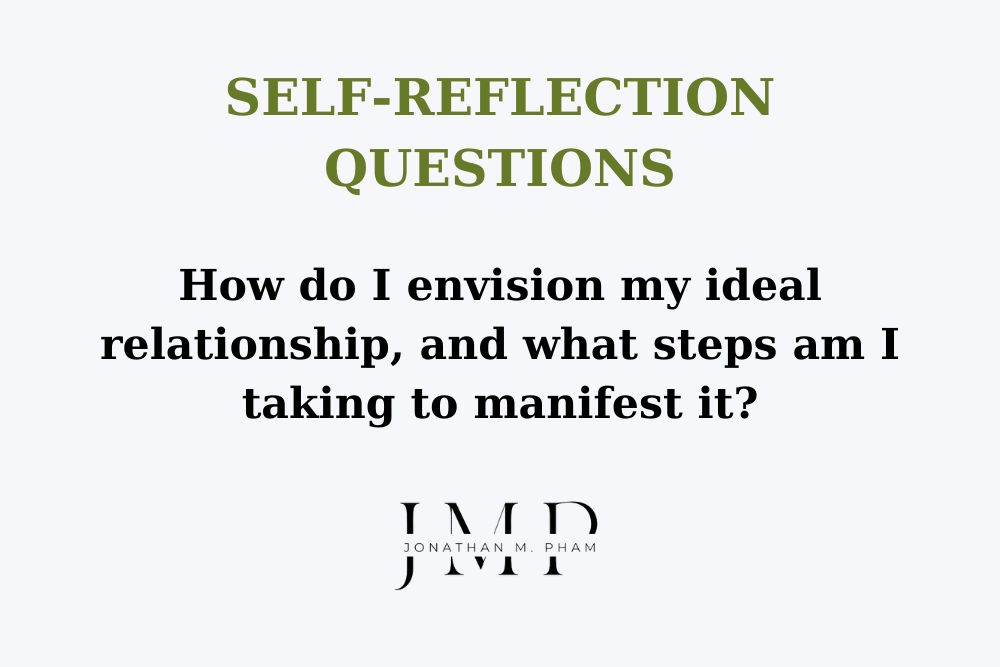
Self-reflection questions for love & relationships
Journaling
- What motivated me to start journaling? What do I hope to achieve through this practice?
- How do I incorporate journaling into my daily or weekly routine, and what benefits have I observed from this consistency?
- What topics or prompts do I find most valuable for journaling, and why?
- How do I approach journaling during challenging times or periods of emotional distress?
- Do I prefer handwritten journaling or digital journaling, and what factors influence my choice?
- How do I review and reflect on past journal entries, and what insights do I gain from this practice?
- What role does journaling play in my self-care routine, and how does it contribute to my overall well-being?
- How do I stay inspired and motivated to journal regularly, especially during busy or challenging times?
- How has journaling influenced my personal growth and self-discovery journey?
- What advice would I give to someone new to journaling and looking to start this practice?
General self & Personal identity
- How would I describe myself in three words, and why would I choose these words?
- What values are most important to me, and how do they shape my decisions and actions?
- How do I define success and fulfillment in life, and what steps am I taking to achieve them?
- What are my core beliefs about myself, and how do they influence my self-image and confidence?
- How do I handle self-doubt and negative self-talk, and what strategies do I use to cultivate self-compassion?
- What role does self-awareness play in my personal growth journey, and how do I cultivate it?
- How do I define my sense of identity, and how has it evolved over time?
- What are my strengths and weaknesses as a person, and how do I leverage them in different areas of life?
- How do I define happiness and fulfillment, and what brings me the most joy and satisfaction in life?
- How do I envision my ideal self, and what steps am I taking to align with this vision?
Read more: 60 Existential Questions – A Daily Toolkit to Explore Life’s Depths
Behaviors, habits & routines
- What are my daily routines and habits, and how do they contribute to my overall well-being and productivity?
- How do I identify and assess my habits, and what criteria do I use to determine whether they’re beneficial or detrimental?
- What strategies do I use to establish and maintain new habits, and how do I overcome obstacles or resistance?
- How do my habits and routines reflect my priorities and values in life?
- What habits or behaviors do I want to change or improve, and why?
- How do I maintain balance and moderation in my behaviors and habits, especially those related to health and well-being?
- What role do habits play in achieving long-term goals, and how do I ensure that my habits are aligned with my aspirations?
- How do I respond when I encounter setbacks or challenges in maintaining my desired habits, and how do I bounce back from them?
- How do I foster a supportive environment and mindset for building and sustaining positive habits?
- What habits or routines have had the most significant impact on my life, and why?
Read more: 30 Growth Mindset Questions – Empowerment through Inquiry
Unconscious biases & assumptions
- What are some unconscious biases or assumptions I’ve become aware of in my interactions with others, and how do they influence my thoughts and behaviors?
- How do I recognize and address unconscious biases in myself and others, especially in professional settings?
- What steps am I taking to educate myself about unconscious biases and cultivate a more inclusive mindset?
- How do unconscious biases impact decision-making processes, and what strategies do I employ to mitigate their influence?
- How do unconscious biases manifest in communication and interactions with others, and how do I ensure fairness and inclusivity in my interactions?
- How do unconscious biases affect team dynamics and collaboration, and what steps can I take to foster a more inclusive and equitable environment?
- What role does self-awareness play in recognizing and addressing unconscious biases, and how do I cultivate self-awareness in this regard?
- How do unconscious biases influence my perceptions of myself and others, and what strategies do I use to cultivate self-compassion and empathy?
- How do unconscious biases impact workplace diversity and inclusion efforts, and what actions can I take to address them effectively?
- What role do accountability and allyship play in combating unconscious biases, and how do I hold myself and others accountable for addressing them?
Read more: Subconscious Mind Power – Exploring The Hidden Force Within
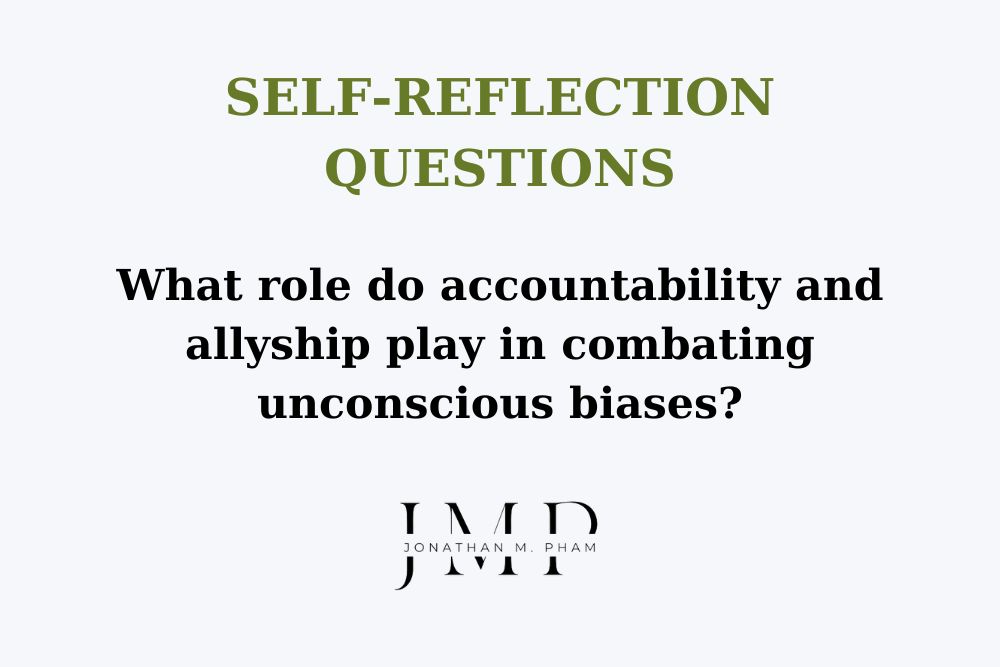
Self-reflection questions for revealing unconscious biases & assumptions
Decision making
- How do I approach decision-making, and what factors do I consider when making important choices?
- What decision-making style do I typically employ, and how does it influence the outcomes of my choices?
- How do I handle difficult or high-stakes decisions, and what strategies do I use to mitigate risks and uncertainties?
- What role do intuition and gut feelings play in my decision-making process, and how do I balance them with rational analysis?
- How do my past experiences and lessons learned inform my decision-making in the present?
- What strategies do I use to overcome decision paralysis or indecision, especially when faced with complex or conflicting options?
- How do I evaluate the effectiveness of my decisions, and what criteria do I use to measure success?
- What role does risk tolerance play in my decision-making process, and how do I strike a balance between risk-taking and caution?
- How do I involve others in the decision-making process, and what benefits do I see in collaborative decision-making?
- What are some common biases or pitfalls in decision-making, and how do I guard myself against them?
Emotional intelligence
- How would I define emotional intelligence, and why is it important in personal and professional settings?
- What are my strengths and areas for improvement in emotional intelligence, and how do they impact my interactions with others?
- How do I regulate and manage my own emotions, especially in high-pressure or stressful situations?
- How do I recognize and respond to the emotions of others, and why is empathy important in building strong relationships?
- How do I handle conflicts or disagreements with others in a way that demonstrates emotional intelligence and promotes positive outcomes?
- What strategies do I use to communicate effectively when emotions are running high, and how do I de-escalate tense situations?
- How do I cultivate self-awareness and self-reflection as part of emotional intelligence development?
- How do I adapt my communication style to different emotional states or personalities, and why is adaptability important in emotional intelligence?
- What role does empathy play in leadership and team dynamics, and how do I foster empathy in my interactions with others?
- How do I handle feedback and criticism in a way that demonstrates emotional intelligence and facilitates personal growth?
Read more: 35 Emotional Intelligence Questions to Ask Yourself for Attaining Self-mastery
Personal growth
- What areas of personal growth am I currently focusing on, and why are they important to me?
- How do I set goals for personal growth, and what strategies do I use to track progress and stay motivated?
- What role does self-reflection play in one’s personal growth journey, and how do I incorporate it into my routine?
- How do I embrace challenges and setbacks as opportunities for growth, rather than obstacles?
- What habits or behaviors do I practice to foster continuous learning and development in my personal and professional life?
- How do I prioritize self-care and well-being as part of my personal growth journey, and what activities or practices do I find most rejuvenating?
- What limiting beliefs or self-doubt do I need to overcome in order to achieve my personal growth goals?
- How do I seek out and leverage opportunities for personal growth and development in daily life?
- How do I measure success in my personal growth journey, and what milestones or achievements am I proud of?
- What advice would I give to someone who is committed to their personal growth journey but feeling stuck or discouraged?
Professional development
- What are my career goals and aspirations, and how do they align with my values and interests?
- How do I identify and leverage personal strengths in my professional development journey?
- What areas of professional development am I currently focusing on, and why are they important for career progression?
- How do I seek out learning and growth opportunities in my professional life, and what strategies do I use to stay updated in my field?
- How do I approach feedback and constructive criticism as part of professional development?
- What role does mentorship play in professional development, and how do I cultivate meaningful mentor relationships?
- How do I navigate career transitions or changes, and what strategies do I use to adapt and thrive in new environments?
- What strategies do I use to build a professional network and cultivate relationships within my industry or field?
- How do I prioritize work-life balance and well-being in my professional development journey?
- How do I measure success in my professional development journey, and what achievements or milestones am I proud of?
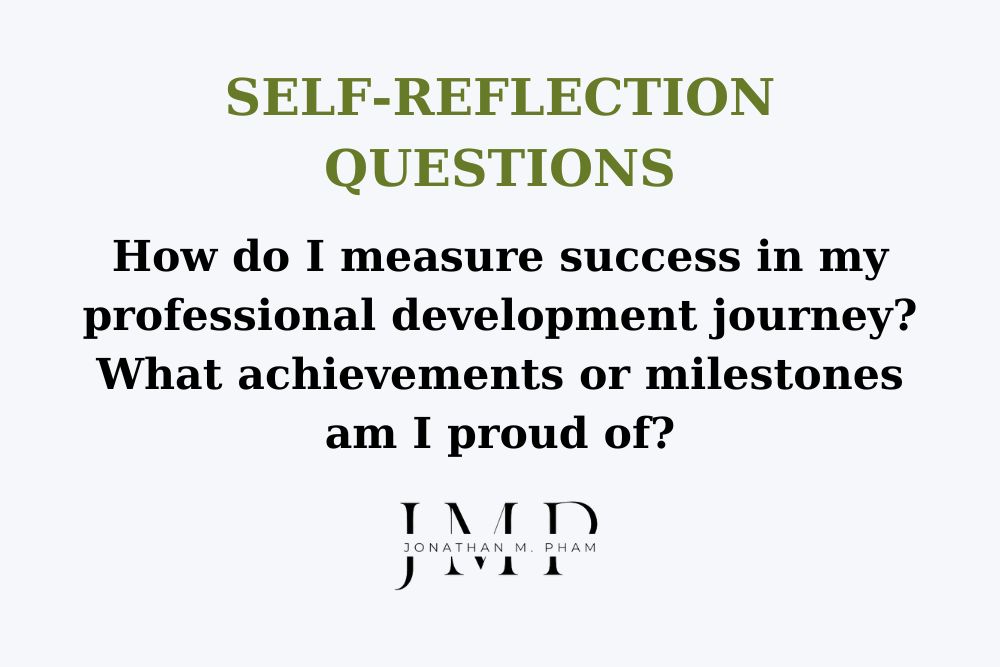
Self-reflection questions for professional development
Goal setting
- How do I define success, and what specific goals am I working toward in various areas of my life?
- How do I set SMART goals (Specific, Measurable, Achievable, Relevant, Time-bound), and why is this framework important for effective goal setting?
- What strategies do I use to prioritize and organize my goals, especially when faced with competing priorities?
- How do I stay motivated and focused on my goals, especially during challenging times or setbacks?
- How do I track progress toward my goals, and what methods or tools do I use to monitor success?
- How do I ensure that my goals are aligned with my values and aspirations, and what role does self-reflection play in this process?
- What strategies do I use to overcome obstacles or challenges that arise while pursuing my goals?
- How do I celebrate achievements and milestones in my goal-setting journey, and why is this important for maintaining motivation and momentum?
- How do I ensure that my goals are both challenging enough to stimulate growth and attainable within a reasonable timeframe?
- How do I adjust and revise my goals as circumstances change or new opportunities arise?
Mental health
- How do I prioritize mental health and well-being in daily life, and what activities or practices do I find most beneficial for maintaining emotional balance?
- What signs or symptoms do I recognize when my mental health is struggling, and how do I respond to these warning signs?
- How do I cope with stress and adversity in healthy ways, and what strategies do I use to build resilience?
- What boundaries do I set to protect my mental health, especially in relationships or work environments that may be stressful or draining?
- How do I practice self-compassion and cultivate a positive self-image, especially during times of self-doubt or criticism?
- How do I foster meaningful connections and social support networks as part of my mental health care routine?
- What role does mindfulness play in my mental health care routine, and how do I incorporate it into daily life?
- How do I address the stigmas surrounding mental health and seek help when needed, despite potential barriers or challenges?
- What strategies do I use to maintain a healthy work-life balance and prevent burnout, especially in demanding or high-pressure environments?
- How do I practice gratitude and cultivate a positive mindset as part of my mental health care routine?
Read more: 45 Mindfulness Questions for Adults – Daily Check-in Prompts for Better Clarity
Physical health
- How do I prioritize physical health and well-being in daily life, and what habits or routines do I engage in to maintain physical fitness?
- What types of physical activity or exercise do I enjoy, and how do I incorporate them into my routine?
- How do I maintain a balanced and nutritious diet, and what strategies do I use to make healthy eating choices?
- How do I prioritize rest and recovery as part of my physical health routine, and what strategies do I use to optimize sleep quality?
- What preventive health measures do I take to maintain physical health, and how do I stay proactive about managing my well-being?
- How do I manage stress and its impact on my physical health, and what coping strategies do I use to reduce stress levels?
- How do I stay motivated to maintain healthy habits, especially when faced with challenges or setbacks?
- What role does self-discipline play in maintaining healthy habits, and how do I cultivate self-discipline in daily life?
- How do I balance the demands of work, personal life, and other responsibilities with my commitment to maintaining physical health?
- How do I incorporate movement and physical activity into daily life, beyond structured exercise sessions?
Read more: 55 Healthy Habits Questions to Inspire Better Lifestyle Choices
Self-love
- How do I define self-love, and why is it important for overall well-being and personal growth?
- What does self-love look like in action for me? How do I show myself love and care in different aspects of life (e.g., relationships, career, personal growth)?
- What practices or rituals do I engage in to cultivate self-love and self-compassion in my daily life?
- How do I practice forgiveness and let go of self-judgment or criticism, especially when faced with mistakes or failures?
- What limiting beliefs or negative self-talk do I need to overcome to fully embrace self-love and self-acceptance?
- How do I prioritize my own needs and well-being without feeling guilty or selfish, especially in relationships or caregiving roles?
- What role do self-care practices play in my self-love journey, and how do I ensure that they are prioritized in daily life?
- How do I practice self-compassion in moments of pain, disappointment, or adversity, and what strategies do I use to soothe and comfort myself?
- What affirmations or mantras do I use to cultivate self-love and reinforce positive self-image and self-worth?
- How do I celebrate and honor my achievements, strengths, and progress as part of my self-love practice?
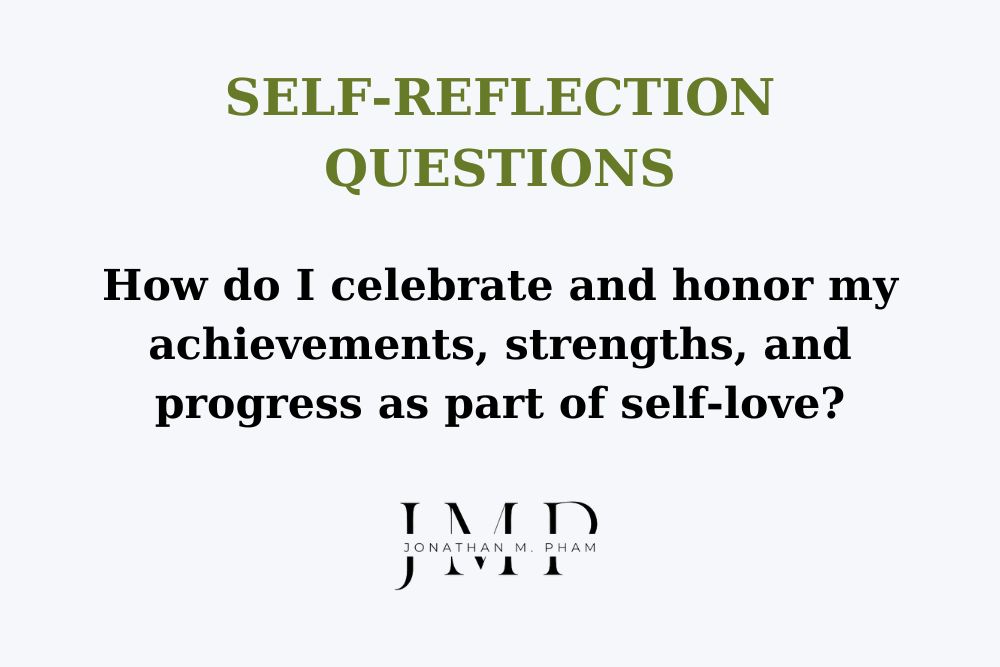
Self-reflection questions for self-love
Spiritual
- How do I define spirituality, and what role does it play in my life and personal development?
- What spiritual practices or rituals do I engage in to nurture my soul and deepen my connection to a higher power or inner wisdom?
- How do I cultivate gratitude and appreciation for the beauty and abundance of life as part of my spiritual practice?
- How do I connect with nature and the natural world as a source of spiritual inspiration and renewal?
- What role does faith or belief play in my spiritual journey, and how do I nurture and deepen my faith over time?
- How do I cultivate inner peace and tranquility amidst the challenges and uncertainties of life?
- How do I cultivate compassion and kindness toward myself and others as part of my spiritual practice?
- How do I integrate spiritual principles or values into my daily life and decision-making process?
- How do I foster a sense of purpose and meaning in life, and what practices or reflections help me align with my higher calling or life’s mission?
- How do I celebrate and acknowledge spiritual growth and progress on my journey? What are some milestones or moments that have marked significant shifts in my spiritual understanding or connection?
Read more: 50 Spiritual Questions to Awaken the Soul for Transformation
Leadership
- How do I define leadership, and what qualities or attributes do I believe are essential for effective leadership?
- What is my leadership style, and how do I adapt it to different situations or team dynamics?
- How do I cultivate trust and credibility as a leader, especially when faced with challenging circumstances or conflicts?
- How do I foster a culture of innovation, creativity, and continuous improvement within my team or organization?
- How do I inspire and motivate my team members to achieve their full potential and contribute to the success of the organization?
- How do I navigate and resolve conflicts within my team or organization, and what strategies do I use to promote constructive dialogue and collaboration?
- How do I prioritize diversity, equity, and inclusion in my leadership approach, and what steps do I take to create a more inclusive and equitable work environment?
- How do I lead through change and uncertainty, and what strategies do I use to help my team navigate transitions and adapt to new challenges?
- How do I foster leadership development and succession planning within my team, and why is this important for the long-term success and sustainability of the organization?
- How do I practice self-care and prioritize my own well-being as a leader, and how does this impact my effectiveness and leadership style?
Read more: Self-leadership – The Art of Leading from Within
Business
- What is my vision for the business, and how do I ensure that it remains aligned with my values and long-term goals?
- How do I define success for my business, and what key performance indicators (KPIs) do I use to measure progress toward my goals?
- How do I identify and capitalize on market opportunities, and what strategies do I use to stay ahead of competitors?
- How do I foster innovation and creativity within my business, and what processes or structures do I have in place to support new ideas and initiatives?
- How do I build and maintain strong relationships with customers, suppliers, and other stakeholders, and why are these relationships important for the success of the business?
- How do I manage risk and uncertainty in the business, and what strategies do I use to mitigate potential threats or disruptions?
- How do I foster a culture of accountability and responsibility within the organization, and what strategies do I use to ensure that goals are met and performance standards are upheld?
- How do I adapt and evolve my business strategy in response to changing market conditions, customer preferences, or industry trends?
- How do I foster a culture of continuous learning and development within the organization, and what resources or opportunities do I provide for employee growth and advancement?
- How do I contribute to the greater good and create a positive impact beyond just profit, and how does this impact my business and stakeholders?
Coaching
- What am I truly passionate about? Is this reflected in my current life choices?
- What are my core values? Do my actions align with these values?
- How can I utilize my strengths and improve my weaknesses?
- Am I living authentically to myself? What could I be doing to live more authentically?
- What are some recent situations where I could have handled myself differently? What can I learn from these experiences?
- What am I grateful for in my life?
- How can I break my long-term goals and aspirations down into achievable steps?
- Am I surrounding myself with positive and supportive individuals? Do my relationships help me grow and thrive?
- What am I currently learning? Am I actively seeking new knowledge and experiences?
- What small change could I make today to improve my life?
Read more: Self-coaching – The Art of Being Your Own Coach
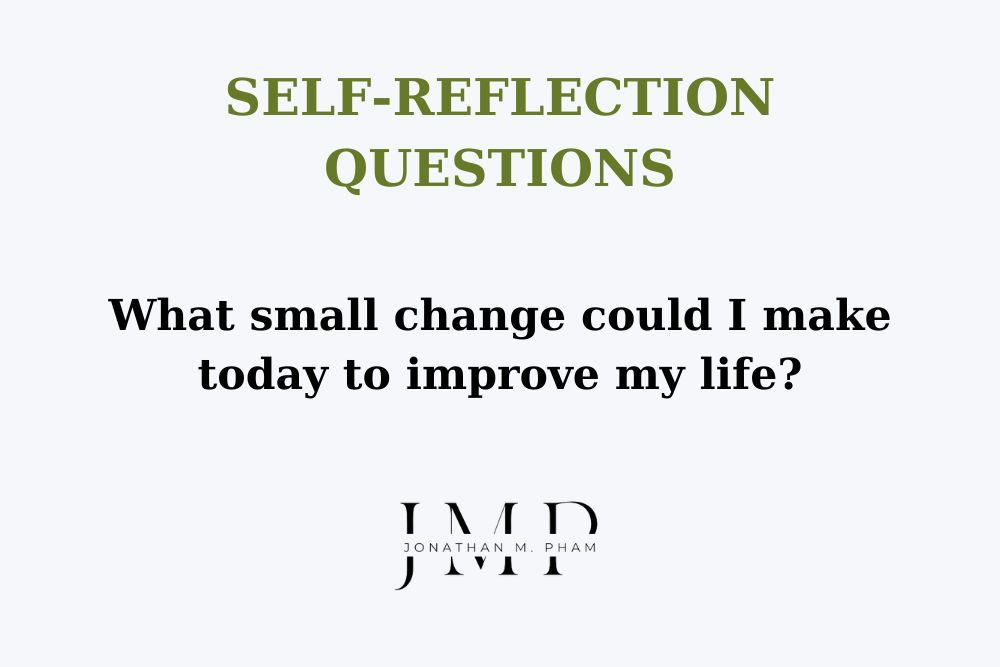
Steps for Asking & Answering Self-reflection Questions
My own brain is to me the most unaccountable of machinery – always buzzing, humming, soaring roaring diving, and then buried in mud. And why? What’s this passion for?
Virginia Woolf
Here, I would like to introduce you to a few steps and tips you may follow to start embarking on a journey of self-discovery and unlocking your full potential.
- Create a dedicated space: Choose a quiet and comfortable environment where you won’t be interrupted. This could be a specific room in your house, a park bench, or even your favorite coffee shop.
- Set the intention: Decide what aspect of yourself you want to explore. Are you looking to gain clarity on your goals, identify your strengths, or understand your emotions better? Having a specific focus will help you choose more appropriate questions.
- Be curious and open-minded: Approach the process with a genuine interest in learning more about yourself and be open to unexpected discoveries.
- Find the right questions: You can either craft your own questions based on your specific needs and interests – or search for online resources and books to get inspiration.
- Use different prompts: Experiment with various question formats like open-ended (“What brings me joy?”), closed-ended (“How many hours of sleep do I typically get?”), or visual prompts like mind maps or collages.
- Start journaling: Dedicate a notebook or digital document specifically for self-reflection. Write down the questions you choose and answer them honestly and thoughtfully.
- Engage multiple senses: Consider incorporating activities like drawing, painting, or listening to music to stimulate your reflection process.
- Engage in deep reflection: Don’t settle for superficial answers. Take your time, delve deeper into your thoughts and feelings, and explore different perspectives.
- Go beyond the surface: Don’t settle for one-word answers. Explore the “why” behind your thoughts and feelings.
- Identify patterns and themes: Look for recurring ideas or emotions that emerge from your reflection. See how they relate to different aspects of your life and experiences.
- Reflect on your emotions: Pay attention to how your answers make you feel. Are you surprised, challenged, or inspired?
- Be honest and non-judgmental: Self-reflection is a journey of self-discovery, not self-criticism. Be honest with yourself, but avoid judging or criticizing your thoughts and feelings.
- Embrace the process: Self-reflection is an ongoing process, not a one-time event. Regularly revisit these questions and explore new ones as you grow and evolve. Patience and consistency are crucial to gaining deeper insights over time. Even 15 minutes each day should make a complete difference.
- Experiment with different methods: Try journaling, meditation, visualization, or talking to a trusted friend to explore your thoughts and feelings.
- Consider multiple perspectives: Approach the process from different angles and viewpoints. You can do this by asking yourself follow-up questions, such as “Why do I think/feel/act this way?”, “How does this affect me and others?”, or “What can I learn from this?”.
- Seek external support: Consider therapy, coaching, or joining a dedicated group for additional guidance and support.
Read more: Design Thinking – How to Reframe Thought Patterns to Unlock Innovation
Self-reflection Questions – Daily, Weekly or Monthly?
The frequency of self-reflection questions depends on your personal goals and preferences. Here’s a breakdown of what to expect from daily, weekly, and monthly reflection:

Daily
Benefits:
- Maintain awareness: Daily reflection helps you stay mindful of your thoughts, emotions, and behaviors throughout the day.
- Track progress: Monitor your progress towards short-term goals and identify areas needing immediate attention.
- Improve mood: Focusing on gratitude and positive experiences helps boost your mood and overall well-being.
Drawbacks:
- Time commitment: Daily reflection may prove to be overwhelming, especially if you have a busy schedule.
- Superficial reflection: Rushing through daily reflection might just lead to superficial answers without deep introspection.
Sample self-reflection questions:
- What am I grateful for today?
- What was one thing I accomplished today?
- What could I have done differently today?
- What am I looking forward to tomorrow?
Weekly
Benefits:
- Gain perspective: Reflecting on a week’s events allows you to see the bigger picture and identify patterns in your thoughts and actions.
- Evaluate progress: Assess your progress towards weekly goals and adjust strategies as needed.
- Learn from experiences: Analyze successes and failures from the week to gain valuable lessons.
Drawbacks:
- Missing nuances: Weekly reflection might mean you will miss important details or fleeting insights that could be captured through daily reflection.
- Delayed course correction: Waiting a week to reflect sometimes delays addressing any issues or challenges that require immediate attention.
Sample self-reflection questions:
- What were my biggest accomplishments this week?
- What challenges did I face this week, and how did I overcome them?
- Did I stay true to my values this week?
- What can I do differently next week to be more productive/fulfilled?
Monthly
Benefits:
- Assess long-term goals: Evaluate your progress towards long-term goals and make adjustments if necessary.
- Identify trends: Reflecting on a month’s experiences can reveal broader behavioral tendencies in your life and overall well-being.
- Celebrate milestones: Acknowledge and celebrate significant achievements from the past month.
Drawbacks:
- Missing details: Important details or specific experiences might be forgotten or lose significance over a longer timeframe.
- Delayed action: Addressing challenges or implementing changes might be delayed due to the longer interval between reflections.
Sample self-reflection questions:
- What are my biggest learnings from this month?
- Did I experience any personal growth this month?
- What areas of my life need more attention next month?
- What am I most excited about for next month?
Ultimately, I would say that the best approach is to combine these frequencies to create a personalized self-reflection routine. Specifically, you can:
- Start your day with a quick daily reflection to set intentions and maintain awareness.
- Dedicate a specific time each week for a deeper reflection, analyzing the past week and planning for the next.
- Schedule a monthly review to assess long-term progress, celebrate achievements, and make strategic adjustments.
The most important thing here is consistency. By incorporating self-reflection questions into your routine, you can gain valuable insights, foster personal growth, and live a more fulfilling life.
Self-reflection is the gateway to freedom.
Dzigar Kongtrul Rinpoche
Beyond Self-reflection Questions: Exercises & Activities to Consider
While self-reflection questions are a powerful tool for self-discovery, they aren’t the only avenue for exploring your inner world. Here are some more engaging exercises and activities to complement your journey:
- Gratitude journaling: Dedicate a few minutes each day to write down 3-5 things you’re grateful for, big or small. This practice cultivates a positive mindset and fosters appreciation for the good in your life.
- Mindfulness meditation: Find a quiet space, sit comfortably, and focus on your breath. Observe your thoughts and feelings without judgment, allowing them to come and go naturally.
- Visualization exercises: Close your eyes and imagine your ideal future in vivid detail. Consider your goals, aspirations, and the emotions associated with achieving them.
- Strengths assessment: Utilize online tools or personality tests to identify your unique strengths and talents. Understanding your strengths empowers you to leverage them effectively and build confidence.
- Values clarification exercises: Brainstorm activities, people, and experiences that bring you joy and fulfillment. Analyze these elements to identify the underlying values that resonate with you – from which you may improve the effectiveness of your decision-making and goal-setting process.
- Creating a vision board: Gather images, quotes, or symbols that represent your aspirations and dreams. Arrange them on a board or digital collage. This visual representation serves as a constant reminder of your goals and motivates you to take action.
- Experimenting with creative expression: Engage in activities like journaling, painting, drawing, or playing music. These creative outlets allow you to express yourself freely and explore your emotions on a deeper level.
- Time capsule creation: Fill a box with items that represent your current life, thoughts, and aspirations. Seal it and plan to open it in the future.
- Engaging in nature: Spend time in nature, go for a walk, hike, or simply sit amongst the trees. Immersing yourself in nature is a good way to promote relaxation, reduce stress, and spark self-reflection.
Try experimenting with different activities to find out what sparks your curiosity and enables a deeper connection with your inner self.
The journey into self-love and self-acceptance must begin with self-examination… until you take the journey of self-reflection, it is almost impossible to grow or learn in life.
Iyanla Vanzant
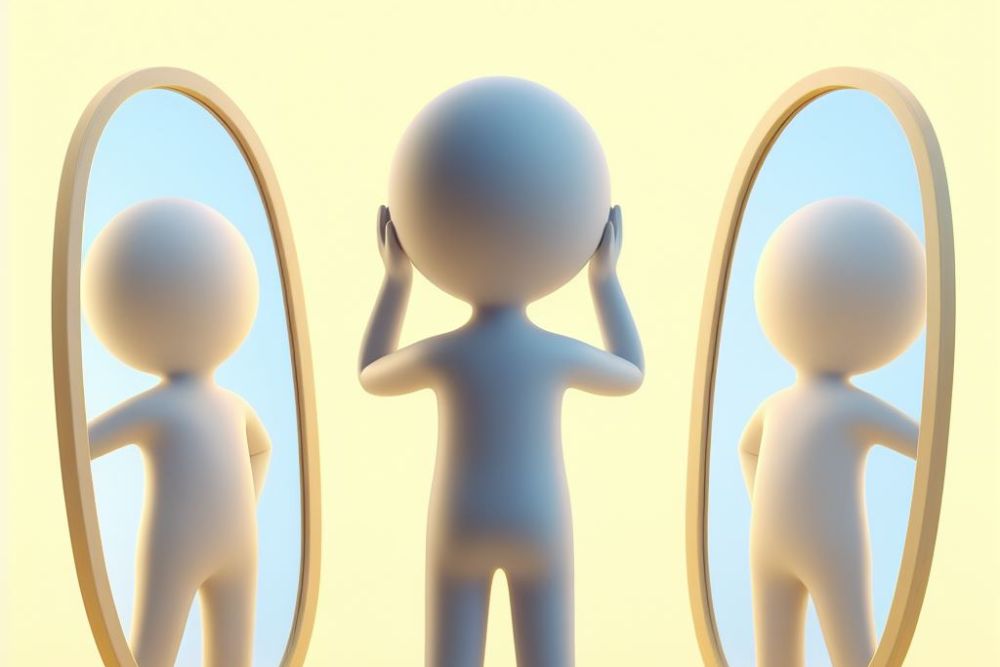
Read more: 32 Self Discovery Activities for Everyone
Final Thoughts
As you embark on your practice of asking daily self-reflection questions, remember that the journey itself holds immense value. Embrace the process, delve into the depths of your being, and celebrate the insights that emerge. With each introspective step, you become better equipped to cultivate self-awareness, navigate life’s twists and turns with newfound clarity, and become the architect of your own fulfilling pilgrimage.
Other resources you might be interested in:
- 77 Self Reflection Quotes: Looking Inward to Awaken
- 180 Friendship Questions for Deeper Connections
- Life of an Introvert: A Few Lines of Personal Reflection
- 20 Best Self-discovery Books: A Journey Within to Find Your North Star
Let’s Tread the Path Together, Shall We?


